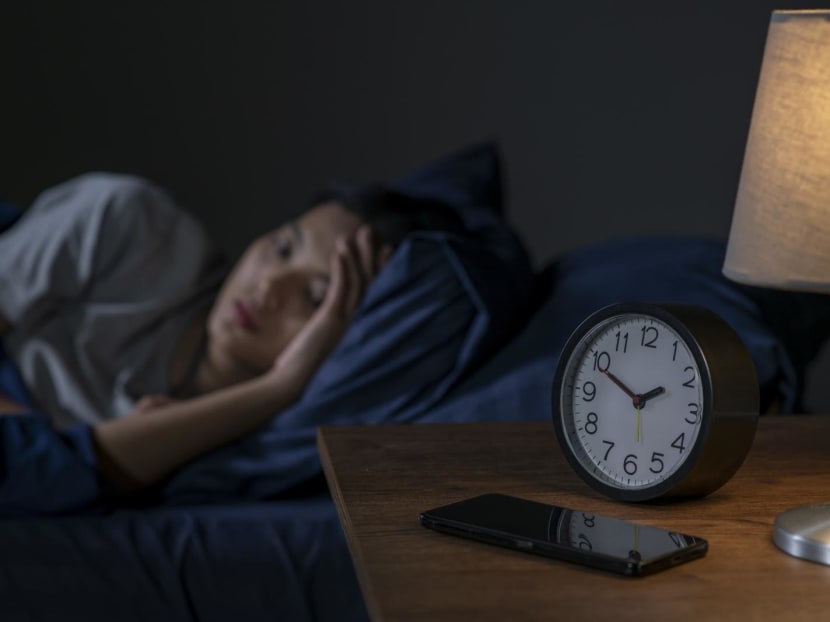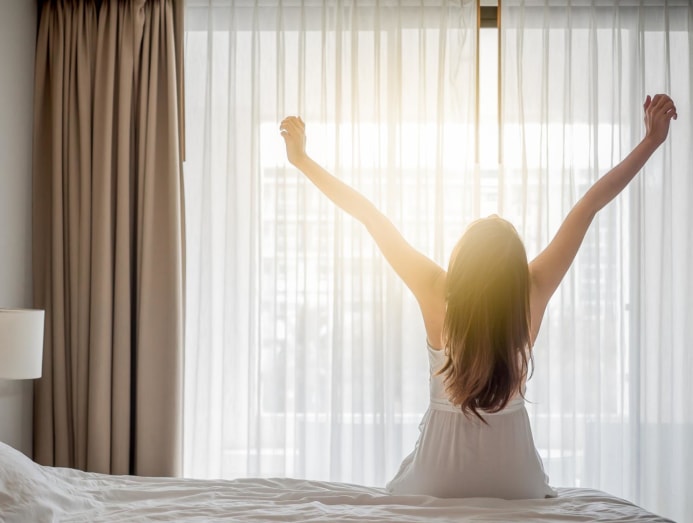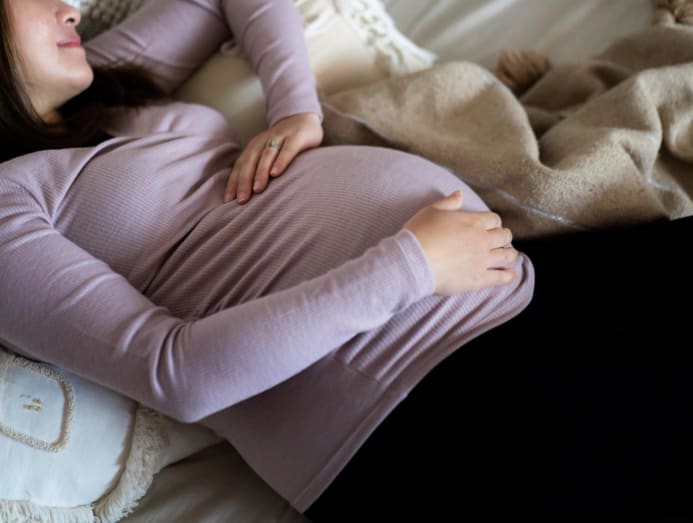Women are more sleep deprived than men and it’s affecting their heart health
Poor sleep quality and being sleep-deprived are putting women at greater risk of cardiovascular disease, a recent study found. CNA Women finds out why women are more affected and what we can do to get a better night’s sleep.

Fragmented sleep is linked to heart attacks, strokes, abnormal heart rhythm and hypertension, experts say. (Photo: iStock/Filmstax)

This audio is AI-generated.
A new study in the scientific journal Circulation has found that women who regularly sleep less than five hours a night have a slightly higher risk of heart disease.
The study, which was published in January, found that of these women, those in midlife (aged 42 to 52 years old) who had persistently high insomnia symptoms had a 75 per cent increased risk of stroke and heart attack.
Dr Serene Wong, a consultant at the Division of Respiratory & Critical Care Medicine, Department of Medicine, National University Hospital Singapore, said fragmented sleep is “associated with coronary artery disease (heart attacks), cerebrovascular disease (stroke), abnormal heart rhythms and hypertension”.
Having fragmented sleep and being sleep deprived also has an impact on memory and learning, immune function, cognitive function, mood and emotional regulation and growth.
WOMEN AND LACK OF SLEEP
The greater psychological distress that comes with a lack of sleep is “significantly stronger in women than in men”, said Dr Chan Wan Xian, a cardiologist at Gleneagles Hospital.
This, in turn, is linked to an elevated risk of heart disease – the top cause of death among Singapore women.

Sleep deprivation activates the sympathetic nervous system – the body’s fight or flight response. “When this happens, cortisol levels (a stress hormone) in the bloodstream increase, leading to inflammation within the body, which can increase risk for hypertension, heart disease and stroke,” said Dr Chan.
A 2008 study in the Brain, Behavior and Immunity journal found that women who had a higher degree of sleep disruption had higher levels of two inflammatory proteins in their system. This not only accounted for their high levels of psychological distress, but also greater feelings of hostility, depression and anger.
LACK OF SLEEP = WEIGHT GAIN
Lack of sleep causes metabolic changes in the body, such as increased insulin resistance, which makes it harder for the body to move glucose from the blood into the cells to be converted into energy.
This in turn, can result in glucose intolerance, which may lead to diabetes.
Sleep deprivation also increases your appetite and craving for foods high in carbohydrates and sugars, which may lead to weight gain and obesity — both are risk factors for heart disease, said Dr Chan.
This is due to the body producing more ghrelin hormones, which stimulate hunger, and less leptin hormones, which signal the feeling of being sated and suppresses appetite.
But studies have shown that getting adequate sleep can improve a person’s blood pressure status and blood sugar metabolism. The former decreases the risk of strokes and heart attack, while the latter reduces insulin resistance and diabetes risk, and may even help control unhealthy weight gain.
WHY DO WOMEN SLEEP SO POORLY?
“For females, the hormone shifts that occur during menstruation, pregnancy, breastfeeding and the menopausal transition can cause, or contribute to, sleep difficulties,” said Dr Chan.
Fluctuating hormone levels, especially during menopause, pregnancy and perimenopause, can result in insomnia, she added. Hormonal fluctuations during menopause can cause hot flashes, night sweats and other symptoms that can prevent you from getting a good night’s sleep.
The female hormones oestrogen and progesterone are also involved in a variety of processes that help regulate sleep and can affect a woman’s sleep-wake cycle.

Oestrogen, for example, is needed to move magnesium into the body’s tissues. The mineral is crucial for synthesising important sleep neurotransmitters (the body’s chemical messengers) such as melatonin.
During perimenopause when oestrogen levels are low, this can lead to insomnia, making it harder to fall asleep.
At the same time, other factors, including social stresses, multiple social roles, life or role transitions, as well as gender-based responsibilities like caregiving, may also affect one’s sleep duration and account for poorer sleep in women.
The bigger problem, shown in the Circulation study, is the accumulated effect of chronic insomnia in females. The midlife women in the study had suffered from poor sleep quality for more than two decades, setting them up for a higher risk of developing heart disease later in life.
Do women need more sleep than men then?
There is limited data describing the specifics of sleep and sleep disorders in women, but Dr Chan said that there is research showing that women may require more sleep than men.
This is something women should pay close attention to. Without adequate sleep, women may be more susceptible to negative health risks, such as heart conditions, diabetes and depression, Dr Chan added.
TRY THESE BEFORE BEDTIME TO SLEEP BETTER
Aside from the usual tips like refraining from using electronic devices prior to bedtime and avoiding caffeine after lunch, there are other ways to improve sleep quality.
Gary Tho, a chiropractor and founder of ChiroWorks, said chiropractic care may contribute to improved sleep quality “by promoting relaxation, reducing aches and pains, and potentially enhancing autonomic balance”. Autonomic balance is the body’s nervous system: It regulates heart rate, blood pressure, respiration, digestion and sexual arousal.

The specific mechanisms in which chiropractic care can influence heart health are still being explored, but the practice is thought to have an indirect impact by easing pressure on the whole body, including the heart.
To start, Tho advised finding a pillow that “promotes correct spinal alignment and provides soft, yet crucial support for the head and neck for the entire night’s sleep”. This, he explained, can help relax the body and help you fall – and stay – asleep
He also recommended two simple exercises to try before sleeping:
1. Horizontal Handstand Lion Stretch
Ideal for relieving stress and tension along the spine – imagine your palms and heels having a tug-of-war.
Step 1: Lie on your back on the bed with your palms pressed against the wall or headboard, and lock your elbows straight. You don’t need a pillow for this.
Step 2: At the same time, press your heels down towards the bed, away from your body. Do not over-arch your spine and don’t allow your shoulders to creep up to your ears; instead, keep them down to create length in your arms and neck.
Step 3: Stay in this “horizontal handstand” for 10-20 seconds, then release the position, bring your arms down to your sides and take some easy breaths. Do this stretch three times.
2. Progressive Muscle Relaxation
Step 1: Lying on the bed, begin at your feet by tensing the muscles in the toes, curling them inwards for a few seconds and then releasing them. Inhale as you contract your muscles and exhale as you relax. “Feel the tension build as you tighten your toes and feel the tension melt as you release the contracted muscles,” said Tho.
Step 2: Repeat this process, working your way upwards – ankles, calves, thighs, hips, buttocks, abdomen, back, chest, arms, fingers, shoulders, neck, face and jaw.
Step 3: Finish by taking a few more slow, easy breaths to continue this sense of calm as you fall sleep.
CNA Women is a section on CNA Lifestyle that seeks to inform, empower and inspire the modern woman. If you have women-related news, issues and ideas to share with us, email CNAWomen [at] mediacorp.com.sg.











